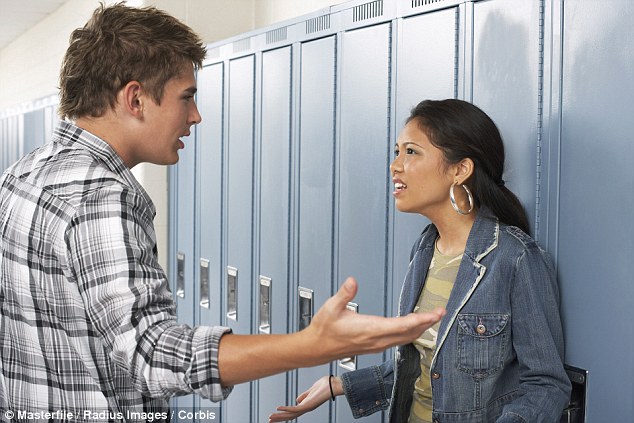Teaching Teens About Healthy Relationships
As I’ve been clearing out my “to do” file of articles, we’ve had a series of posts about parenting teens through puberty and preparing for the skill-set and tasks of adulthood. Pediatricians are in a position to have many opportunities to talk to teens about life issues and I’m thinking that perhaps you’d like to see some “bullet points” of common issues we address.
A pediatrician is a specialist in child and adolescent medicine
Of course, I’ve edited out all specific personal information but here is the core information of the common and often lengthy discussions turned into bullet points – and there’s a lot of ’em.
Signs of Healthy Relationships
A rather catchy phrase that I learned from some of the information put out by the American Academy of Pediatrics (AAP) for teens, simply tells them to “Expect Respect.”
I like it for its brevity; but that, I’m afraid, is its downfall. It only tells a small part of the story and not the part that describes the core issue. Respect is, by and large, earned not “demanded.” The crux of how they should be developing is to become a person who makes their decisions and does their actions in a way that will command respect – that’s how to create healthy relationships.
However, in the realm of their relationships with other people it is important for them to learn how to spot the signs of respect and disrespect so they can both grow in how they treat others in addition to being able to choose beneficial friends, associates and life-companions.
So, if someone asks you to list the signs of a healthy relationship for a teen you should at least list: respecting each other, knowing that you make each other better people, sharing common interests but allowing for outside friends and activities too and settling disagreements peacefully and with respect.
Respect
• You ask each other what you want to do.
• No one tries to control the other person.
• There is no suggestion of any dangerous, harmful or illegal activities.
• There is regard for the others that you’ve already chosen as friends and those you already know care about you.
Common Interests
• You enjoy doing things together, but no one feels forced to do anything.
• If you do have a disagreement—and it’s OK to disagree—you both get to say what you want, talk until you’re both happy, and then go out and enjoy what you’ve planned… or not.
Being With Each Other or Being Apart
• You enjoy each other’s company and feel happy when together.
• You each feel free enough to have your own friends and interests outside the relationship.
I always cap a discussion of these list items with the statement that: “you can’t read your friend’s mind and know what their true motives and intentions are: BUT, you CAN read yourself and know how you feel about yourself when you’re around them.”
Love will not limit or diminish your life but makes room for, even encourages, expansion, discovery and growth. Infatuation, on the other hand, is possessive, smothering, limiting, exclusive and in many ways related to stalking.
Ways To Make Your Relationship Healthy
Relationships are supposed to make both people feel happy. People should feel good about what happens when they are together. Teens should always keep in mind the tell-tale warning signs that let them know when things go amis.
Respect Each Other
Show you really care by sharing your thoughts and feelings. Listen to what your partner has to say. Expect give and take. Use appropriate language designed to build and not tear down.
Ask About The Other Person’s Interests
Talk about sports, music, or movies – whatever helps you get past any awkward feelings and get to know each other better. Be careful voicing any negative opinions because you don’t know what interests your partner.
Have A Life Outside The Relationship
People are more attractive to each other if they have other interests. Keep up with your schoolwork, friends, and the activities you enjoy that do not involve your partner. Understand that puberty changes a lot of things including feelings of attachment.
Expect such new and intense feelings to happen and take them for what they are: new experiences. The new emotional experience that tends to be stronger than previous is not what we mean by “true love.” It may take some effort to keep things in perspective.
Resolve Disagreements With Love and Respect
People don’t always have to agree on movies, music, or favorite sports, or even on how often to call or see each other. It is only natural for people to disagree. The important thing is how you reach an agreement. With a good attitude, you can have a healthy disagreement.
Signs of An Unhealthy Relationship
In the throws of new and intense emotional experiences the signs that the relationship isn’t going well are often hard to spot until they’ve caused some pain. Feelings of fear, stress, and sadness are not part of a healthy relationship.
Lack of respect
Some people are more sensitive to being treated with lack of respect than others. You must be careful to not let your desire that the new feelings keep going make you overlook your partner treating you with disrespect.
You may “go along” with something even if you think it is not right. You feel bad about what happens when you are together. Those are tell-tale signs of disrespect and an unhealthy relationship.
Being held back
Special relationships take time out of your schedule. At first you may not mind the excuse to not do homework or see other friends or do other activities you’ve always enjoyed doing. On the other hand, any new relationship should not take over your life and make you feel like you are being held back.
If your partner does not let you succeed in school, or you are made to feel guilty about doing things that interest you – that’s a sign of an unhealthy relationship.
Controlling behavior
Being held back often begins with controlling behavior. Showing controlling behavior can be a sign of a personality trait that will lead to other issues.
Manipulation is another aspect of controlling behavior. You might hear, “If you love me, I need to know where you are.” Your partner might also show it by not caring about your friends.
Feeling “crazy in love”
If one or both of you calls the other all the time – that’s unhealthy. Or if you feel your partner is possessive and smothering.
Getting blamed for your partner’s problems
This one is a significant sign that for many years parents should already have been teaching you to recognize and not fall for; because, it can lead to “enabling” abusive situations.
If you hear, “This is all your fault” it should tell you to stop and reevaluate your relationship. It often means trouble.
Feeling jealous most of the time
A little bit of jealousy is normal. A lot of jealousy, or allowing jealousy to control what goes on between the two of you, will hurt the relationship.
Trying to change the other person’s behavior
If one of you tells the other, “My way or no way” that statement always demands the choice of “It’s No Way then!”
When you can talk about a problem, an unhealthy relationship can become a healthy one. But, if you can’t find ways to enjoy the time that you spend together, it may mean that it is time to end the relationship.
Crossing The Line
There are some things that should never happen in a relationship. Your relationship has serious problems if any of the following things are happening.
Verbal Abuse
Screaming, swearing, bullying, or calling each other names is never all right. Such language is ALWAYS a sign of disrespect and most of the time a precursor to other acts of anger.
Breaking or Hitting Objects During An Argument
Often associated with verbal acts of anger, actual acting out is NEVER something that you should over-look or explain away. Anger directed toward inanimate objects is but a small threshold away from anger directed toward a person.
Pushing, Shoving, Hitting, or Kicking In Anger
Letting one’s anger rage to the point of contact with another person shows a significant problem in one’s personality which is rarely overcome without help. Even if there was no real damage this time, these are obvious danger signs that cannot be ignored.
Trying To Control The Other Person’s Behavior
When the unhealthy behavior of trying to change the other person’s behavior crosses the line into trying to control the other person it’s time to seek companionship elsewhere and probably time to get a respected adult involved.
Forced Sex
You always have the right to refuse attention or affection. Is there really anything else to say?
Threats
If one of you does not get your way, a threat is made to hurt either the other person or yourself.
If your relationship is crossing the line, the behavior needs to stop right away or the relationship needs to end. If you are having trouble ending a relationship, seek the help of an adult who cares about your well-being.
Talk with an adult you trust about how to end an abusive relationship safely. Use what you have learned to help make your next relationship better.
No Excuse For Abuse
It may be difficult for a teen to understand, but when abuse occurs while in a dating relationship there is absolutely no reason that can be given that makes it correct for the non-offending teen to attempt to solve the offenders personal issues. There are no children or financial entanglements which would suggest joint counseling or continued dating. Feeling sorry for the offending person and altruistically desiring to help is not the province of another developing teen – a responsible adult must be involved.
Nothing You Say or Do Is A Reason To Be Abused
When things have calmed down, try saying:
• “I hated it when you swore at me. Don’t do that again.”
• “Don’t treat me that way. I have done nothing to deserve being _______.”
• “If you are upset, tell me. I can try to help, but yelling, screaming, and swearing at me does not help.”
• “If you treat me like that again, it’s over” – and follow through, no third chances.
Obedience Is Not Respect
On the flip side of the coin:
Nothing Anyone Says or Does Is A Reason For You To Be Abusive
You both deserve to be liked and respected. Using force, power, or control may only “get your way.” But it is not how to get respect.
If You Push Your Partner Around, You May Get Your Way, But You Lose Your Partner’s Respect, Support, and Love.
If You Are Crossing The Line, STOP!
If you can’t stop, get help.
• A teacher, coach, or counselor at school can help you learn how to treat your partner with respect.
• A spiritual leader or an adult at an after-school activity or club can help you learn how to control emotions, like anger or jealousy, and avoid abusive behavior.
By changing your behavior, you can get the true respect, support, and love that you deserve.
[http://www.healthychildren.org/English/ages-stages/teen/dating-sex/pages/Expect-Respect-Healthy-Relationships.aspx]
12 Posts in Parenting - Sex (parenting-sex) Series
- Medical Consent by Teens For Their Own Care, by state – 3 Jun 2016
- Talking To Girls About Menstruation – 23 Apr 2016
- Link - Sexual attraction and orientation – 6 Sep 2015
- Parenting: Healthy Relationships – 2 Sep 2015
- Link - Am I ready for sex? – 31 Aug 2015
- Parenting about sex and peer pressure – 27 Aug 2015
- Talking to Your Teen About Sex – 13 Jul 2014
- Adolescent Gyn or Pelvic Exams – 11 Jun 2014
- Sexting, What Parents Should Know – 3 Jun 2013
- Sexting, What Teens Should Know – 1 Jun 2013
- Sexting: Risky Teen Behavior – 30 May 2013
- Parenting About Sex, Pressure and Promiscuity Series: Intro/Index – 28 May 2013




